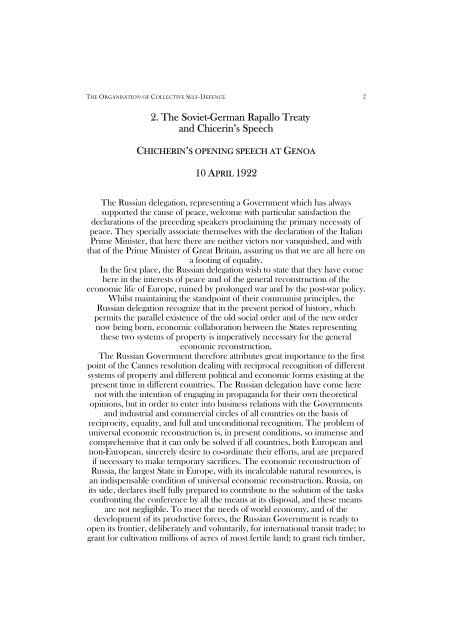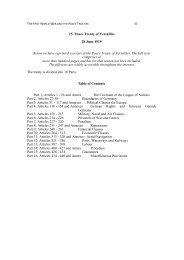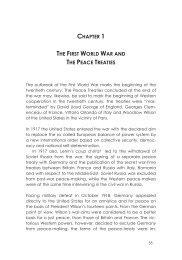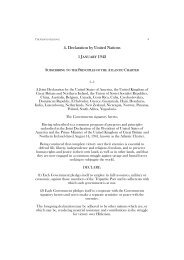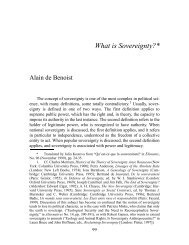2. The Soviet-German Rapallo Treaty and Chicerin's Speech
2. The Soviet-German Rapallo Treaty and Chicerin's Speech
2. The Soviet-German Rapallo Treaty and Chicerin's Speech
You also want an ePaper? Increase the reach of your titles
YUMPU automatically turns print PDFs into web optimized ePapers that Google loves.
THE ORGANISATION OF COLLECTIVE SELF-DEFENCE 2<br />
<strong>2.</strong> <strong>The</strong> <strong>Soviet</strong>-<strong>German</strong> <strong>Rapallo</strong> <strong>Treaty</strong><br />
<strong>and</strong> Chicerin’s <strong>Speech</strong><br />
CHICHERIN’S OPENING SPEECH AT GENOA<br />
10 APRIL 1922<br />
<strong>The</strong> Russian delegation, representing a Government which has always<br />
supported the cause of peace, welcome with particular satisfaction the<br />
declarations of the preceding speakers proclaiming the primary necessity of<br />
peace. <strong>The</strong>y specially associate themselves with the declaration of the Italian<br />
Prime Minister, that here there are neither victors nor vanquished, <strong>and</strong> with<br />
that of the Prime Minister of Great Britain, assuring us that we are all here on<br />
a footing of equality.<br />
In the first place, the Russian delegation wish to state that they have come<br />
here in the interests of peace <strong>and</strong> of the general reconstruction of the<br />
economic life of Europe, ruined by prolonged war <strong>and</strong> by the post-war policy.<br />
Whilst maintaining the st<strong>and</strong>point of their communist principles, the<br />
Russian delegation recognize that in the present period of history, which<br />
permits the parallel existence of the old social order <strong>and</strong> of the new order<br />
now being born, economic collaboration between the States representing<br />
these two systems of property is imperatively necessary for the general<br />
economic reconstruction.<br />
<strong>The</strong> Russian Government therefore attributes great importance to the first<br />
point of the Cannes resolution dealing with reciprocal recognition of different<br />
systems of property <strong>and</strong> different political <strong>and</strong> economic forms existing at the<br />
present time in different countries. <strong>The</strong> Russian delegation have come here<br />
not with the intention of engaging in propag<strong>and</strong>a for their own theoretical<br />
opinions, but in order to enter into business relations with the Governments<br />
<strong>and</strong> industrial <strong>and</strong> commercial circles of all countries on the basis of<br />
reciprocity, equality, <strong>and</strong> full <strong>and</strong> unconditional recognition. <strong>The</strong> problem of<br />
universal economic reconstruction is, in present conditions, so immense <strong>and</strong><br />
comprehensive that it can only be solved if all countries, both European <strong>and</strong><br />
non-European, sincerely desire to co-ordinate their efforts, <strong>and</strong> are prepared<br />
if necessary to make temporary sacrifices. <strong>The</strong> economic reconstruction of<br />
Russia, the largest State in Europe, with its incalculable natural resources, is<br />
an indispensable condition of universal economic reconstruction. Russia, on<br />
its side, declares itself fully prepared to contribute to the solution of the tasks<br />
confronting the conference by all the means at its disposal, <strong>and</strong> these means<br />
are not negligible. To meet the needs of world economy, <strong>and</strong> of the<br />
development of its productive forces, the Russian Government is ready to<br />
open its frontier, deliberately <strong>and</strong> voluntarily, for international transit trade; to<br />
grant for cultivation millions of acres of most fertile l<strong>and</strong>; to grant rich timber,
THE ORGANISATION OF COLLECTIVE SELF-DEFENCE 3<br />
coal, <strong>and</strong> mining concessions, particularly in Siberia, <strong>and</strong> a number of other<br />
concessions throughout the territory of the RSFSR. It aims at economic<br />
collaboration between the industry of the West <strong>and</strong> the agriculture <strong>and</strong><br />
industry of Russia <strong>and</strong> Siberia, of such a nature as to enlarge the basis of<br />
European industry, in regard to raw materials, grain, <strong>and</strong> fuel, to a degree far<br />
surpassing the pre-war level. A more detailed draft of a plan of general<br />
economic reconstruction can if necessary, be presented by the Russian<br />
delegation in the course of the conference. That its realization from the<br />
financial <strong>and</strong> economic point of view is perfectly possible is clear from the fact<br />
that the capital which would have to be invested annually for this purpose,<br />
which would guarantee the future of European production, would be equal to<br />
only a small part of the annual expenditure of the countries of Europe <strong>and</strong> of<br />
America on their armies <strong>and</strong> navies.<br />
(...)<br />
TREATY OF RAPALLO<br />
16 APRIL 1922<br />
<strong>The</strong> <strong>German</strong> Government, represented by Reichsminister Dr. Walther<br />
Rathenau, <strong>and</strong> the Government of R.S.F.S.R., represented by People’s<br />
Commissar Chicherin, have agreed upon the following provisions:<br />
I. <strong>The</strong> two Governments agree that all questions resulting from the state of<br />
war between <strong>German</strong>y <strong>and</strong> Russia shall be settled in the following manner:<br />
(a) Both Governments mutually renounce repayment for their war<br />
expenses <strong>and</strong> for damages arising out of the war, that is to say, damages<br />
caused to them <strong>and</strong> their nationals in the zone of war operations by<br />
military measures, including all requisitions effected in a hostile country.<br />
<strong>The</strong>y renounce in the same way repayment for civil damages inflicted on<br />
civilians, that is to say, damages caused to the nationals of the two countries<br />
by exceptional war legislation or by violent measures taken by any<br />
authority of the state of either side.<br />
(b) All legal relations concerning questions of public or private law<br />
resulting from the state of war, including the question of the treatment of<br />
merchant ships which fell into the h<strong>and</strong>s of the one side or the other<br />
during the war, shall be settled on the basis of reciprocity.<br />
(c) <strong>German</strong>y <strong>and</strong> Russia mutually renounce repayment of expenses<br />
incurred for prisoners of war. <strong>The</strong> <strong>German</strong> Government also renounces<br />
repayment of expenses for soldiers of the Red Army interned in <strong>German</strong>y.<br />
<strong>The</strong> Russian Government, for its part, renounces repayment of the sums<br />
<strong>German</strong>y has derived from the sale of Russian Army material brought into<br />
<strong>German</strong>y by these interned troops.
THE ORGANISATION OF COLLECTIVE SELF-DEFENCE 4<br />
II. <strong>German</strong>y renounces all claims resulting from the enforcement of the laws<br />
<strong>and</strong> measures of the <strong>Soviet</strong> Republic as it has affected <strong>German</strong> nationals or<br />
their private rights or the rights of the <strong>German</strong> state itself, as well as claims<br />
resulting from measures taken by the <strong>Soviet</strong> Republic or its authorities in any<br />
other way against subjects of the <strong>German</strong> state or their private rights, provided<br />
that the <strong>Soviet</strong> Republic shall not satisfy similar claims made by any third<br />
state.<br />
III. Consular <strong>and</strong> diplomatic relations between <strong>German</strong>y <strong>and</strong> the Federal<br />
<strong>Soviet</strong> Republic shall be resumed immediately. <strong>The</strong> admission of consuls to<br />
both countries shall be arranged by special agreement.<br />
IV. Both Governments agree, further, that the rights of the nationals of either<br />
of the two Parties on the other’s territory as well as the regulation of<br />
commercial relations shall be based on the most favored nation principle.<br />
This principle does not include rights <strong>and</strong> facilities granted by the <strong>Soviet</strong><br />
Government to another <strong>Soviet</strong> state or to any state that formerly formed part<br />
of the Russian Empire.<br />
V. <strong>The</strong> two Governments undertake to give each other mutual assistance for<br />
the alleviation of their economic difficulties in the most benevolent spirit. In<br />
the event of a general settlement of this question on an international basis,<br />
they undertake to have a preliminary exchange of views. <strong>The</strong> <strong>German</strong><br />
Government declares itself ready to facilitate, as far as possible, the<br />
conclusion <strong>and</strong> the execution of economic contracts between private<br />
enterprises in the two countries.<br />
VI. Article 1, Paragraph (b), <strong>and</strong> Article IV of this Agreement will come into<br />
force after the ratification of this document. <strong>The</strong> other Articles will come into<br />
force immediately.


